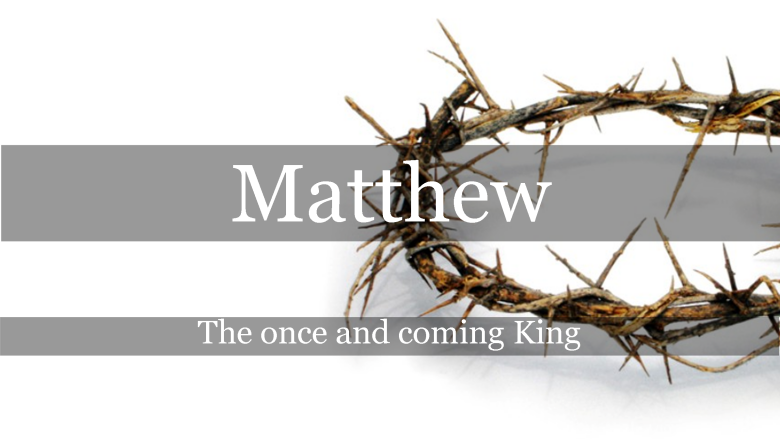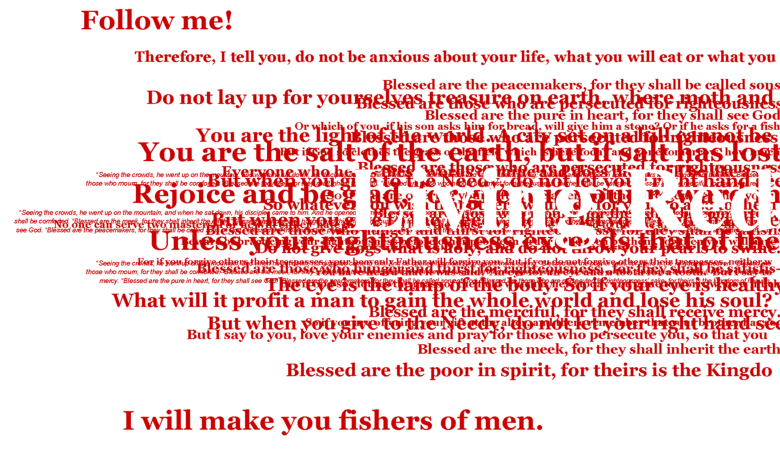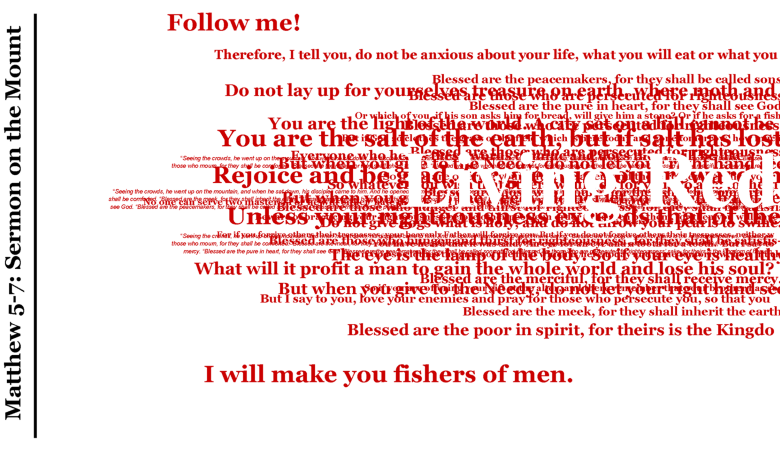Matthew 18:1-4, "Climbing Down Into Greatness"
All along in the book of Matthew, we’ve seen how Matthew arranges the focus of this book to portray the truth that Jesus was the promised Messiah. Even though the 4 gospels record many of the same stories, they sometimes emphasize different details to portray different themes and perspectives. The book of John more so stresses the contrast between seeing everything through a tangible, earthly lens and comprehending the spiritual reality of what Jesus was saying and doing. Nevertheless, that theme has still been present in the book of Matthew. For example, when Jesus taught that people need to worry less about the purity of the food they ate and more about the purity of their hearts. And then again in chapter 16 when he foretold of his death and resurrection. Peter jumped in and said “This shall never happen to you” and Jesus replied “Get behind me Satan... you are not setting your mind on the things of God, but the things of man.” because there was infinite spiritual significance to Jesus’ physical suffering and death. We’re going to see that again in this morning’s text, where the people around Jesus continue to look at the world around them and ascribe value to things based on physical, earthly thinking and Jesus is going to challenge them to look beyond. To think spiritually and to see everything through his eyes. The technical term for this is “worldview”. The perspective through which one sees and interprets the world.
[READ MATT. 18:1-5]
- 1-2. Jesus is with the twelve disciples here. He had taught again and again and again and again that following Him meant putting Him first, and facing persecutions, and to be hated by the world, and to surrender comfort. And they followed Him. And they believed that He was the Son of God. They believed Him and continued to follow Him even at times when everyone else turned away. They followed Him and were made low, and believed that He would soon establish HIs Kingdom, and trusted that they would be in it. But then they ask who will be the greatest in that Kingdom. They know He’s number one, but perhaps number 2 is still up for grabs. They believe that he has power over everything, and they’ve seen him display that power. So for whoever gets to be number 2 in his kingdom, that means power, position, honor, authority, perhaps wealth. Who’s it gonna be? They want to know because they’re each hoping it’s them. Mark’s telling of this story reveals that they didn’t simply approach Jesus and ask, but that they were even arguing about it with each other as they were traveling. But when the question is finally asked, Jesus doesn’t even answer it immediately. He calls a child over to Him first, and then he addresses the disciples.
- 3. “Truly, I say to you, unless you turn and become like children, you will never enter the kingdom of heaven. Jesus doesn’t give the answer that any of them were hoping for. They were each hoping to hear their name. They wanted assurances of power and greatness. Instead He said, unless you turn, which means unless you change, none of you are even getting in to the kingdom of heaven. Now that had to be a gut punch for the disciples. After everything they have done, and learned, and witnessed, and endured, Jesus says that in the current state of their hearts, that they can’t even enter. They still need to change and become like children. Jesus speaks in the next verse about humbling oneself like the child he had called into their midst. And that hones us in to the specific change they needed to make as well as the problems with their hearts. They needed to humble themselves.
Children were not people of status. A child is not wise or educated. They are not strong. They rely on their parents for everything. Parents supply their housing, their food, their clothes, for a number of years you change their diapers, you feed them, you teach them everything. I’ve been telling Abigail that she’s turning three this week, so it’s high time she starts bringing home the bacon and helping out. I haven’t actually said that. If I did, she would just get confused and ask me where the bacon was and then get really upset when she realized there wasn’t any. They don’t bring home a paycheque. They don’t contribute. You fix something or clean something and they ruin it again in about 5 minutes. They need your help for almost every aspect of life. Someone else has authority over nearly every aspect of their life and they have no authority over anyone else. And as Jesus has traveled all over Israel teaching and working miracles, He’d been inviting people to come and follow him. And the didn’t. They rejected him. They accused him. And in just a short time, they were going to kill him. But yet, when Jesus called the child, the child came. A child knows that he must respect and obey adults. He didn’t know what Jesus wanted with him. If that child were anything like me, he probably would’ve been afraid that he had done something wrong, that he was in trouble, or even that he was about to be ridiculed for something. So we need to take notice of the child’s readiness to trust and obey though nearly everyone did not.
The disciples were arguing about honor and gain. In spite of everything they had done and endured, that selfish and prideful heart was still exactly opposite of what Jesus demanded of them. They were paying dues and trying to calculate the dividends they thought they were earning. Jesus wanted them to be childlike. He wanted them to assume the mindset that they were lowly, uneducated, dependent for all their needs. This directly opposes the mindset that they have paid their dues and earned honor and authority. As a child trusts and relies on his parents, Jesus wants His disciples to trust Him and rely on Him.
Now I want to make one point here. There is a huge difference between being humble and being pessimistic and defeated. The humble assumes an attitude of service and respect. The defeated simply give up. They assume that they can’t do anything at all, so why even try. Philippians 2:3-4 reads: “Do nothing from rivalry or conceit but in humility count others more significant than yourselves. Let each of you look not only to his own interests, but also to the interests of others. I think that’s just about the clearest explanation of humility we could hope for. Count others more significant than yourselves, and look to the interests of others.
- 4. Whoever humbles himself like this child is the greatest in the kingdom of heaven. We live in a world that rewards ambition and aggression. The harder you work, the more you earn. Dreams of aspiration can be reached through commitment, dedication, and sacrifice. People sacrifice time, energy, money, experiences, and even dreams, and values and beliefs all for the sake of accomplishing a task or attaining a goal. People face off with other people of similar skills and compete for jobs and promotions. I always hate interviews because you have to talk about why you rock and how you’re better fit for whatever you’re pursuing than anyone else. We’re trying to win. We live in a world where people climb up the ladder of success and greatness. But that’s not how Jesus describes greatness in the kingdom of heaven. Instead of linking it to the strong, He uses greatness as the descriptor of the humble. If we’re truly humble, considering others more significant than our selves, then greatness won’t be found anywhere on our radar of desires and pursuits. If it is, then you’re not pursuing Jesus. We’re pursuing ourselves.
So it’s quite the conundrum. Greatness can be achieved, but not if you actually pursue it. Last week, we had a movie night with Abigail and we watched Homeward Bound. It follows the story of these three pets that are separated from their family and trying to get back to them. Their ordinary animals, but the movie does portray that can communicate with each other. At the beginning, there’s a wedding at the house, with lots of food. The young untrained pup is running all over the house trying to get into all the good food. He’s begging and trying to steal, but is ultimately unable to get anything. Then the cat mocks him and shows off her skill... She cuddles up to her owner, and the girl offers her a big shrimp. And the cat rejects it. She doesn’t want it. The girl continues to offer the shrimp but still the cat rejects, only wanting to be near her master. Finally, the cat gives in to the offer of the girl. She accepts the prize of the shrimp. And not only that, but for her selflessness and love for the girl, she’s rewarded with a second shrimp. THe cat comes back and boasts to the pup and explains that you can’t want it. When you don’t want it, then you’ll get it. Now this analogy obviously fall short on a number of levels. First, we all know that dogs much smarter and all around better than cats. Secondly, animals obviously don’t talk, except for Balaam’s donkey in the book of Numbers. But in all seriousness, this analogy falls short in that you can’t just act humble. If one were to only “act” humble, they would not truly be counting others more significant than themselves. They would still be acting out of conceit. They would still be trying to earn the best and the most for themselves. If one does that, if you “want it” you end up exactly where the disciples were... receiving Jesus’ condemnation of unless you turn, you will never enter the kingdom of heaven.
I want us to look at a couple passages that help give us perspective about being great in the kingdom of heaven. The first passage is 1 Corinthians 12:27-31. [READ] These verses come right in the middle of Paul explaining God’s grand design in which He uniquely gifts each believer in order to fully carry out God’s work for us. So in vs 31, when it says “earnestly desire the higher gifts” Paul does not at all mean to say that we need to all be pastors. That would be in direct contradiction of what he just said. So what does it mean to desire or to set our hearts on the higher gifts. It was through apostles and prophets that the Holy Spirit gave us His holy word, scripture. God is not adding to scripture, thus we believe that those two gifts have ceased. However we can still set out hearts on them by prioritizing God’s word and teaching it. For example, Geordie Milne and Russ Miller. As I have spoken with these two men, they have both expressed to me that they do not believe God has gifted them to be teachers or pastors. But on a Sunday morning, even though our worship service starts at 11:00, these two men arrive weekly at 8:30 or earlier. They do this to ensure that as people arrive, we are fully prepared to begin our time of collectively praising God and studying his Scripture. Their work here also ensure that whoever is preaching that morning can take his time to prepare and teach God’s word as best he can so he doesn’t have to spend all his time setting up chairs and running the sound board. Geordie and Russ are not personally aspiring to be pastors, but they have made themselves low, offered their services in order to exalt the Gospel. This is just one small way that they have “desired” the higher gifts; set their hearts toward them.They exalt the message that stirs faith and salvation. That is greatness. God is great. He is the one who saves. He is the one we exalt.
The next passage we’ll look at is 2 Corinthians 12:8-10. [READ]. Here we see Paul learning to humble himself like a child, to be weak, to be vulnerable, to not be the hero, but to point to and credit the true hero, Christ. We can only be truly strong when Christ is strong in us. In order for Christ to be strong, we must admit our sins, our failures, our shortcomings. Like a child, we must ask for him to help us do all the things we cannot. We must trust him when He does things we don’t understand and be ready to obey him regardless. This is a childlike humility.
vs 5. Whoever receives one such child in my name receives me. Jesus just said that we needed to become like children, so when he says “one such child” here, He is not speaking specifically about children, but about anyone who humbles himself before God. The humble, the lowly. Whoever receives the lowly, receives Jesus. This can be the true test of our humility. Let’s go back to Philippians 2:3 again. [READ vs. 3-11] Jesus took on humanity. He took on weakness. The Holy eternal one took on hunger, and fatigue, temptation, pain, and death. He was obedient, but it was more than doing what the Father told him. He took the place and the punishment of us. And not just us, but all of us. The worst parts of us. He took the place of the wicked, though He was perfect. I don’t think we can understand what it means to receive the lowly without understanding how and why Jesus did that for us. It’s hard to receive the lowly. It’s easy to receive the strong because they don’t need anything from us. In fact, they probably help us, and strengthen us. They’ve got everything together. Their pleasant to be around. But when we receive the lowly, we come alongside them in the mess of each others sins and failure. That’s not easy and it’s not fun. But when we do that, we receive them like a child, wanting to care for them, what’s best for them, to teach them, to assist them as they slowly learn and perhaps struggle to finally master things. When we do that, we’re pointing them to Christ. We preach Christ. We act as Christ wants us. It’s hard. That’s why it’s not normal and earthly to do. When we do that, when we are truly humbled, day in and day out, we receive Christ, because we have surrendered our hearts, our entire lives to Christ. “Whoever receives one such child in my name receives me.”
Don’t climb the ladder, go down it. Don’t be great, be lowly, be broken, be honest, be a servant. Don’t pursue greatness. Pursue Christ’s greatness. The reason we should not desire greatness is because nothing is greater than Christ. Therefore, desire Him.
Series Information

The Gospel of Matthew is a story about a once and coming King. Jesus of Nazareth is the Son of David, the long awaited for Messiah. He has come once, and Matthew tells the story of His arrival, ministry, sacrificial atoning work on the cross, and His promise to return soon.






